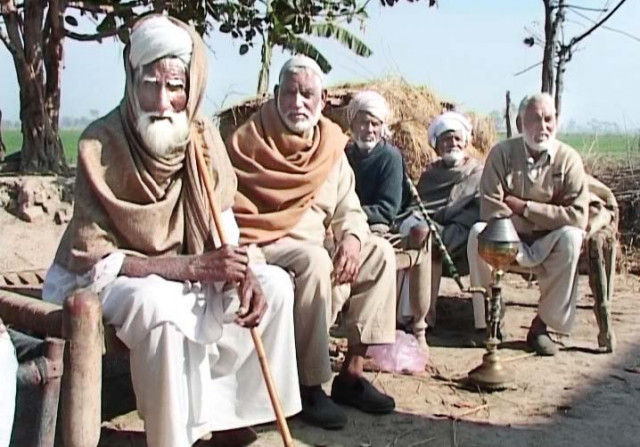.
ISLAMABAD:
The Supreme Court ordered provincial governments to take concrete measures for the welfare and protection of elderly people, emphasizing the constitutional obligation to safeguard family life, dignity and social security.
In a nine-page judgment written by Justice Salahuddin Panwar, the Supreme Court directed the Sindh government to establish and ensure effective functioning of protection committees in every district within ninety days, as required under Section 19 of the Sindh Domestic Violence (Prevention and Protection) Act, 2013.
The court also ordered the Legal and Parliamentary Affairs Department of the Punjab government to look into this matter, take necessary steps and introduce a welfare code for senior citizens which includes a communal fund and a simple maintenance court.
The verdict came during the hearing of a real estate dispute between a father and his children.
According to the filing, the complainant – a retired doctor and a senior citizen – alleged that his two adult children, a daughter and a son from a dissolved marriage, illegally dispossessed him of his house located at 24-B, Sunset Boulevard, DHA Phase-II Extension, Karachi.
He contended that even though he had provided financial support for the education of the petitioners in Pakistan and abroad, they eventually became violent towards him and forced him to leave his own residence.
The father filed a complaint before the Additional Sessions Judge, Karachi South under Section 3 of the Unlawful Dispossession Act, 2005, following which bail warrants were issued against his children. The petitioners challenged the order before the Sindh High Court (SHC), which rejected their plea, leading them to approach the SC.
A three-member bench headed by Justice Muhammad Hashim Khan Kakar posed the question whether “a complaint under Section 3 of the 2005 Act can be maintained in a family setting of permissive possession between a father and his adult children, in the absence of clear material indicating criminal intent to unlawfully dispossess, seize or occupy.”
The judgment observed that the law was a “special criminal law intended to protect lawful owners and occupiers against forcible dispossession and grabbing of land by unauthorized persons”.
He clarified that its application was not limited to so-called “qabza groups or land mafias”, but extended to anyone who forcibly enters or controls another’s property “with the intention of dispossessing, seizing, controlling or occupying”.
The ruling highlights that Pakistan’s constitutional framework “places the family at the heart of social life”, with Articles 9 and 14 guaranteeing the security and dignity of the person, Article 31 obligating the state to enable Muslims to live according to Islamic injunctions, and Article 35 mandating the protection of the family, mother and child.
“In our collective, not individualistic, social fabric, the home is a place of mutual care, interdependence and trust,” the judgment said, adding that “Islamic law and ethics accord the highest status to parents and the elderly and enjoin upon them kindness, respect and service. Criminal laws must therefore be applied in a way that deters abuse without breaking up family unions or criminalizing ordinary friction within them.”
The court warned that “deploying the IDA 2005 within a permissive family and fiduciary framework risks causing excessive criminalization and distorting the law beyond its text, purpose and spirit.”
He also referred to the Sindh Domestic Violence (Prevention and Protection) Act, 2013, noting that it defines an aggrieved person broadly and guarantees, through Section 9, the right of residence of women, children or other vulnerable persons in a shared household.
“Section 19 mandates district-level protection committees with multidisciplinary composition including expertise in psychology and social welfare,” the judgment observed, adding that “the implementation of Section 19 of the Sindh Domestic Violence (Prevention and Protection) Act, 2013 remains patchy.”
The judgment reaffirms that “the Sindh government will ensure that protection committees are fully constituted and functional in each district, comprising psychologists and psychosocial workers, and that their referral pathways are activated so that families are supported and vulnerable persons protected without resorting to an overly broad criminal procedure.”
He further noted that while the Islamabad Capital Territory Senior Citizens Act, 2021 exists, “provinces bear the primary responsibility for social protection”.
“Frames to combat domestic violence are uneven in their protection of vulnerable people,” the ruling continues, explaining that Sindh and Balochistan define “aggrieved persons” broadly to include any vulnerable person, while Punjab and Khyber Pakhtunkhwa largely limit protection to women.
“Sindh and Khyber-Pakhtunkhwa have long passed laws on senior citizens, and Balochistan has followed suit, while Punjab has so far only tabled a bill on the welfare of senior citizens,” the judgment said.
“These divergences lead to protection based on geography rather than need and invite a principled harmonization that respects provincial autonomy while ensuring a basis of dignity for the elderly and other dependents.”
The court said it was “constitutionally appropriate and administratively imperative” for the Punjab government to consider two complementary approaches: “first, broadening the definition of aggrieved person in its Domestic Violence Act to include any vulnerable person, thereby enabling prompt civil protection for dependent elderly persons within the domestic sphere; a modest welfare fund and a simple and summary court for the maintenance and care of parents.”
The judgment further stated that such legislation should “provide for conciliation procedures based on notice, calibrated stay orders, maintenance and care plans, rapid execution and civil sanctions in the first instance, reserving criminal sanctions in case of contumacious non-compliance”.
“This approach would be consistent with Articles 9, 14, 31 and 35 of the Constitution and our collective philosophy which reveres parents and protects family life,” the court added.
Copies of the judgment were ordered to be sent to the legal departments of Balochistan and Khyber Pakhtunkhwa through their chief secretaries and advocates general “for information and such analogous action as they may deem fit”.




